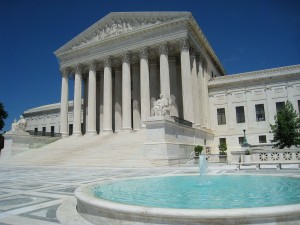Leading Federal Appeal Attorneys: Your Companions in Navigating the Appeals Process
Leading Federal Appeal Attorneys: Your Companions in Navigating the Appeals Process
Blog Article
Debunking the Process of Federal Appeals: What You Need to Know
Navigating the detailed realm of government appeals can frequently feel like traversing uncharted waters for those unknown with the process. Understanding the nuances of appellate court territory, the complexities of submitting a notification of appeal, providing an engaging brief, and making an influential oral debate are important elements that can considerably affect the result of an instance. By deciphering the layers of intricacy surrounding government allures, people can get a more clear understanding right into the devices that control this important stage of the legal system.
Understanding Federal Appeals Process
Looking into the complex world of the government allures process unveils a methodical and organized journey via the judicial system. Federal charms function as a crucial device for examining decisions made by reduced courts. Understanding this procedure is vital for any individual associated with legal proceedings at the federal degree.
The process typically begins with a celebration dissatisfied with a reduced court's judgment filing a notice of charm. This activates a testimonial by a greater court, where a panel of judges evaluates the lawful arguments provided by both events. Briefs outlining the lawful thinking behind each party's placement are submitted, and dental arguments may be heard to clear up complicated issues.
The appellate court's decision is based on an extensive assessment of the reduced court's process and the debates offered. As soon as the appellate court reaches a decision, it can affirm, turn around, remand, or modify the lower court's ruling, giving clarity and finality to the lawful dispute.
Appellate Court Territory Described
Appellate court territory refers to the scope of cases that a certain appellate court has the power to make a decision and examine upon. Unlike test courts that hear cases for the very first time, appellate courts are restricted to evaluating choices made by reduced courts.
Appellate courts have territory over particular sorts of situations, commonly those involving lawful mistakes, procedural concerns, or inquiries of regulation instead than factual conflicts. The jurisdiction of appellate courts is generally outlined in laws and legislations that govern the court system. Understanding appellate court territory is crucial for celebrations associated with the appeals procedure as it determines whether a case is qualified for testimonial and the degree to which the appellate court can interfere in the reduced court's choice.
Filing a Notice of Allure
The preliminary action in starting the federal charms process includes submitting a Notice of Allure with the ideal appellate court. This critical record officially alerts the court and the various other parties associated with the instance that the appealing party means to look for a review of the reduced court's choice. Submitting a Notification of Allure is a strict step-by-step need that establishes the appellate process in activity.
When preparing the Notification of Allure, it is vital to make certain conformity with the certain policies and standards of the appropriate appellate court. federal appeal attorneys. The file has to typically include details such as the instance name, the reduced court's name, the day of the judgment being appealed, and a succinct declaration showing the premises for the charm

Rundown and Oral Debate
In the appellate procedure, providing created briefs and participating in oral debates play essential duties in promoting for the appealing event's setting before the appellate court. Briefs are thorough legal documents that outline the celebrations' disagreements, lawful authorities, and analysis sustaining their placements. These created submissions provide the court with a comprehensive understanding of the realities of the case, the pertinent law, and why the appealing event thinks the reduced court's decision must be rescinded.
Complying with the entry and review of the briefs, oral debates offer the events a possibility to further clarify their positions, deal with any kind of inquiries the appellate judges may have, and highlight bottom lines from their written briefs. Oral disagreements are a chance for the attorneys to convince the courts via verbal advocacy and reactions to questions from the bench.
Both the written briefs and oral debates are essential components of the appellate process, enabling events to present their instance extensively and compellingly prior to the appellate court. - federal appeal attorneys
Getting the Appellate Court Choice
The appellate court's choice is normally supplied in a written format and lays out the court's final thoughts on the legal issues presented, the thinking behind their decision, and the judgment rendered. The time structure for getting the appellate court's decision can differ, yet courts aim to supply prompt resolutions. Whether the appellate court attests, reverses, or remands the reduced court's choice, understanding the implications of the ruling is important for all events entailed in the appellate procedure.
Final Thought
To conclude, the federal allures procedure is a facility yet crucial action in seeking justice. Comprehending the appellate court jurisdiction, submitting a notification of charm, preparing briefs, and providing oral debates are all essential parts of this process. Inevitably, getting the appellate court decision can provide clearness and resolution to legal disagreements. It is crucial to browse the federal appeals process with diligence and focus to detail to attain a fair end result.
As we advance from understanding the government charms procedure to studying the complexities of appellate court jurisdiction, an essential element comes to light pertaining to the authority and limitations of these higher courts in the lawful landscape. Appellate court jurisdiction refers to the range of cases that a particular appellate court has the power to review and make a decision upon. Unlike test courts that listen to instances for the very first time, appellate courts are limited to reviewing choices made by lower courts. Comprehending appellate court jurisdiction is critical for celebrations included in the appeals process as it identifies whether a situation is eligible for evaluation and the extent to which the appellate court can interfere in the lower court's choice.

Report this page